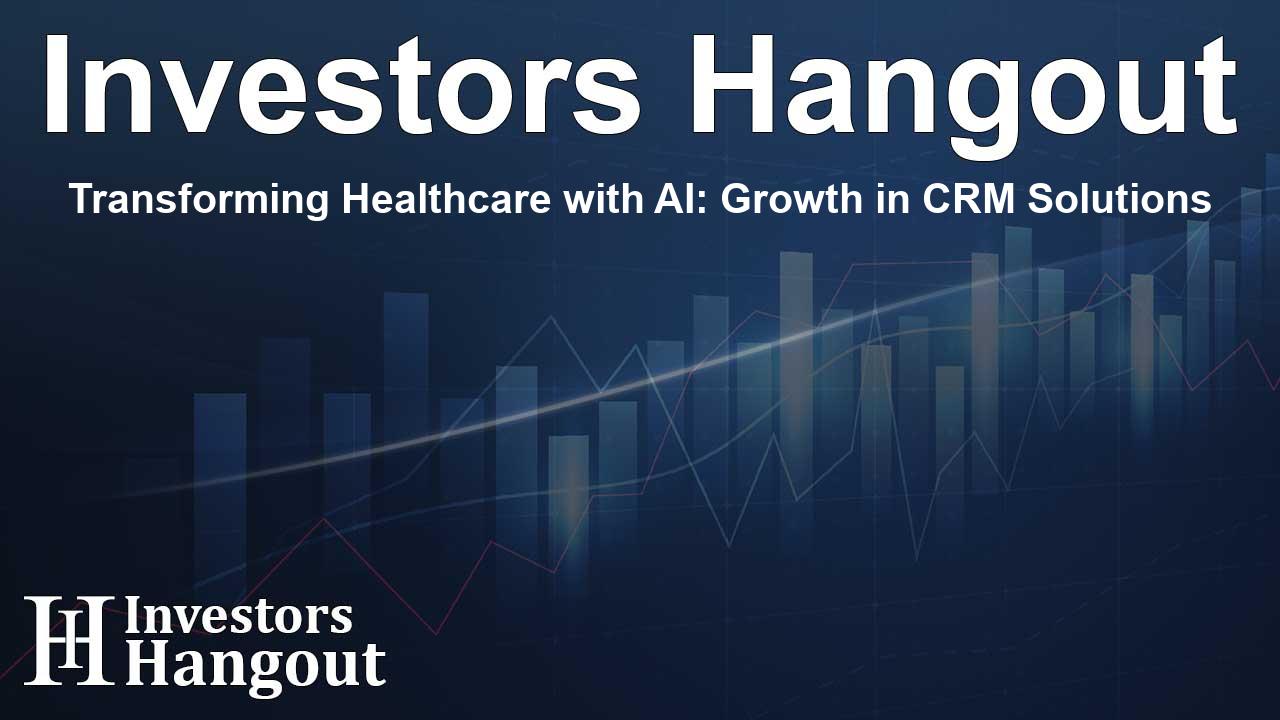Transforming Healthcare with AI: Growth in CRM Solutions

Empowering Healthcare Through CRM Innovations
The customer relationship management (CRM) market in healthcare is undergoing a remarkable evolution, with expectations of growing by USD 11.3 billion through 2028. This growth is driven largely by an increasing demand for personalized healthcare services. As more patients seek tailored care experiences, healthcare organizations are beginning to integrate advanced CRM tools that leverage artificial intelligence (AI) for more effective patient engagement and management.
Driving Factors Behind CRM Growth in Healthcare
Personalized Care and Engagement
Personalization is a key trend reshaping the healthcare CRM landscape. Health professionals are realizing that delivering personalized patient care relies heavily on understanding patient demographics and preferences. AI technologies enhance the ability to gather insights from patient interactions, enabling healthcare professionals to create customized communication strategies. This can include automated reminders for appointments and medication schedules, relevant follow-ups, and health alerts that resonate with patients’ unique situations.
Cloud-Based Solutions on the Rise
One of the exciting advancements in the healthcare CRM space is the shift towards cloud-based solutions. These innovations provide significant advantages over traditional, on-premise systems, such as improved scalability and cost-effectiveness. Healthcare providers now have the flexibility to access crucial patient data at anytime and from anywhere, which is vital in the context of increasing remote healthcare services. This accessibility is especially beneficial in the current climate, where telehealth is becoming the norm due to the growing acceptance of virtual care.
Challenges of Implementing CRM Systems in Healthcare
Implementation Costs and System Integration
Despite the benefits, implementing CRM systems presents challenges. High initial costs and difficulties integrating these systems with existing legacy setups often deter healthcare organizations from fully embracing CRM solutions. The complexity of aligning new CRM technology with old systems can lead to inefficiencies and fragmented patient care.
Data Privacy and Security Concerns
In the healthcare industry, data privacy is an absolute requirement, making it crucial for CRM solutions to comply with regulations like HIPAA. Ensuring patient data security while using CRM tools that collect and manage sensitive information is paramount. Healthcare organizations must prioritize selecting CRM systems that include robust security features to safeguard patient data and maintain regulatory compliance.
Emerging Trends Shaping the Future of CRM in Healthcare
The Role of AI in CRM Solutions
Artificial intelligence continues to redefine the CRM landscape in healthcare. It not only enhances data analysis capabilities but also improves operational efficiencies and patient interaction quality. Leveraging AI, healthcare providers can recognize patterns in patient data and proactively address needs, thereby enhancing the overall patient experience.
Continuous Adaptation to Patient-Centric Models
The healthcare sector is increasingly leaning towards patient-centric models. By harnessing CRM technology, healthcare institutions can better understand patient behaviors and preferences, facilitating smoother transitions from diagnosis to treatment and follow-up care. By adopting CRMs that cater specifically to these needs, healthcare providers can optimize patient pathways, ensuring better health outcomes and higher satisfaction rates.
Frequently Asked Questions
1. What is driving the growth of CRM solutions in healthcare?
The growth of CRM solutions in healthcare is primarily driven by the demand for personalized care, increased patient engagement, and the adoption of cloud-based systems.
2. How is AI impacting CRM in the healthcare sector?
AI enhances CRM by improving data analysis, allowing for personalized communications and proactive patient engagement strategies.
3. What challenges do healthcare providers face when implementing CRM systems?
Key challenges include high implementation costs, difficulties with system integration, and maintaining data privacy and security compliance.
4. Why are cloud-based CRM solutions preferred over traditional systems?
Cloud-based solutions offer scalability, flexibility, and accessibility, enabling healthcare providers to manage patient relationships remotely.
5. How does data security play a role in CRM implementation?
Data security is crucial to protect sensitive patient information and comply with regulations like HIPAA, making the choice of secure CRM systems essential.
About The Author
Contact Riley Hayes privately here. Or send an email with ATTN: Riley Hayes as the subject to contact@investorshangout.com.
About Investors Hangout
Investors Hangout is a leading online stock forum for financial discussion and learning, offering a wide range of free tools and resources. It draws in traders of all levels, who exchange market knowledge, investigate trading tactics, and keep an eye on industry developments in real time. Featuring financial articles, stock message boards, quotes, charts, company profiles, and live news updates. Through cooperative learning and a wealth of informational resources, it helps users from novices creating their first portfolios to experts honing their techniques. Join Investors Hangout today: https://investorshangout.com/
The content of this article is based on factual, publicly available information and does not represent legal, financial, or investment advice. Investors Hangout does not offer financial advice, and the author is not a licensed financial advisor. Consult a qualified advisor before making any financial or investment decisions based on this article. This article should not be considered advice to purchase, sell, or hold any securities or other investments. If any of the material provided here is inaccurate, please contact us for corrections.
